How to Choose Lawn Fertilizer
BY TAHA JAVED | JULY 27TH, 2023 | BLOGLawn fertilizers are one of the key ingredients for good soil because they supply essential nutrients that encourage the healthy development of your grass. But the challenging part is choosing the right lawn fertilizer that will work well for you. For this purpose, you must investigate your lawn’s nutrient requirements and decide which fertilizer will fulfill your soil’s specific needs.
This guide provides all the information you need to buy the best fertilizer for your lawn.
You can give your grass the push it needs to thrive and become the envy of every passerby by choosing the right fertilizer. So, let’s dive into the world of lawn fertilizers and discover the most important aspects to consider while choosing.
How to Read the Lawn Fertilizer Label

Photo Credit: JackF / Canva Pro / License
When exploring lawn fertilizers, you’ll frequently encounter a three-number combination on fertilizer labels known as the NPK ratio. NPK stands for nitrogen (N), phosphorus (P), and potassium (K), which are three critical elements for the growth and health of your lawn. The NPK ratio on the fertilizer label represents the relative amounts of these nutrients in the product.
Each nutrient has a distinct purpose:
- Nitrogen stimulates leaf and stem growth and promotes a bright green color.
- Phosphorus aids root growth and development.
- Potassium boosts overall strength and resilience.
A fertilizer with a ratio of 10-5-5 comprises 10% nitrogen, 5% phosphorus, and 5% potassium. The numbers are always in this order. Multiply the percentages by the amount of fertilizer contained in the package to know how many pounds of each nutrient are in that fertilizer.
For example, consider a 50-pound bag of fertilizer with an NPK ratio of 15-4-10. The nutrient calculation will go as follows:
15% (0.15) nitrogen x 50 pounds of fertilizer = 7.5 pounds of nitrogen
4% (0.04) phosphorous x 50 pounds of fertilizer = 2 pounds of phosphorous
10% (0.10) potassium x 50 pounds of fertilizer = 5 pounds of potassium
Understanding the NPK ratio is similar to deciphering a secret code that tells you how much of each essential nutrient your grass will receive. Depending on your lawn’s requirements, you can select a fertilizer with the proper NPK ratio to correct deficiencies and provide the necessary nutrition.
To know what NPK ratio goes best with your lawn, you must assess your soil and figure out which nutrients it’s lacking, as well as consider the requirements of your specific grass type.
Assess What Nutrients Your Lawn Needs
Different lawns have different nutritional requirements. Finding out exactly which nutrients will benefit your grass the most is essential when choosing a lawn fertilizer. The main two factors to assess your lawn’s nutritional needs are:
- Type of grass: There are two categories of grasses: warm-season grasses and cool-season grasses. Understanding a lawn’s grass type can help you choose the best fertilizer mix for its unique demands. For instance, cool-season grasses like Kentucky bluegrass require more nitrogen to thrive than warm-season grasses like Bermudagrass. So, the first step in assessing your lawn’s needs is identifying your grass type.
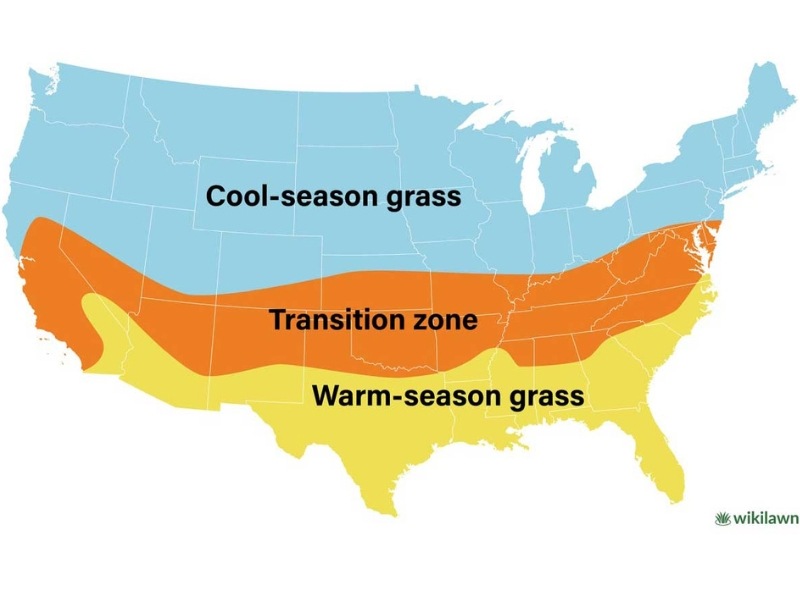
Infographic by Juan Rodriguez
Once you know what type of grass is growing in your yard, you can also figure out the best time of year to fertilize it with our guide, When and How to Fertilize Your Lawn.
- Soil condition: Soil is another essential factor that defines your lawn’s fertilizer needs. Run a soil test to know what nutrients your soil is lacking. A soil test also helps you assess the soil’s pH level to bring it to favorable fertilization conditions. You can send a soil sample to your local Cooperative Extension office for a more in-depth analysis or buy an at-home test kit for a quicker, cheaper assessment.
Based on the soil test results and your grass type, you can choose a fertilizer with the proper nutrient ratios to treat deficiencies and keep your soil healthy. For instance, if the test shows your soil lacks the recommended amount of nitrogen for healthy growth of your grass type, you’ll have to purchase a high-nitrogen fertilizer.
Different Types of Lawn Fertilizers
There are various options of lawn fertilizers available on the market, and you have to know what they all are before you can decide which is right for your lawn. Following are the primary different types of lawn fertilizers with their specifications to help you make the right decision.
Granular Fertilizers
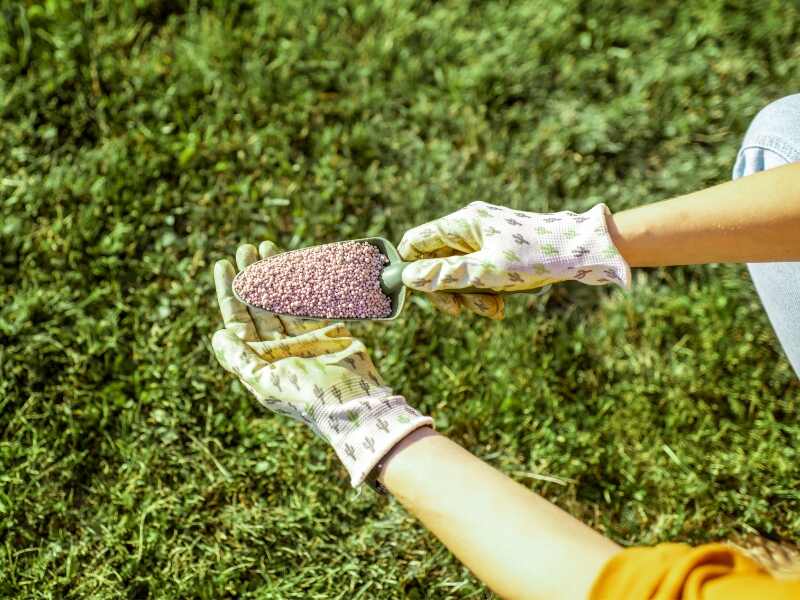
Photo Credit: RossHelen / Canva Pro / License
Granular fertilizers are solid, pellet-like fertilizers that are popular among homeowners. They are available in various formulations, including slow-release and quick-release, which provide controlled or quick nutrient delivery. The steady release reduces the risk of overfeeding and helps your grass maintain a consistent growth rate.
Granular fertilizers are beneficial for more extensive areas because you can distribute them evenly across the entire lawn. The granules also pose less risk of fertilizer burn than liquid fertilizers, and the results last longer because the little specks take longer to break down into the soil. You can apply them using a fertilizer spreader.
Liquid Fertilizers
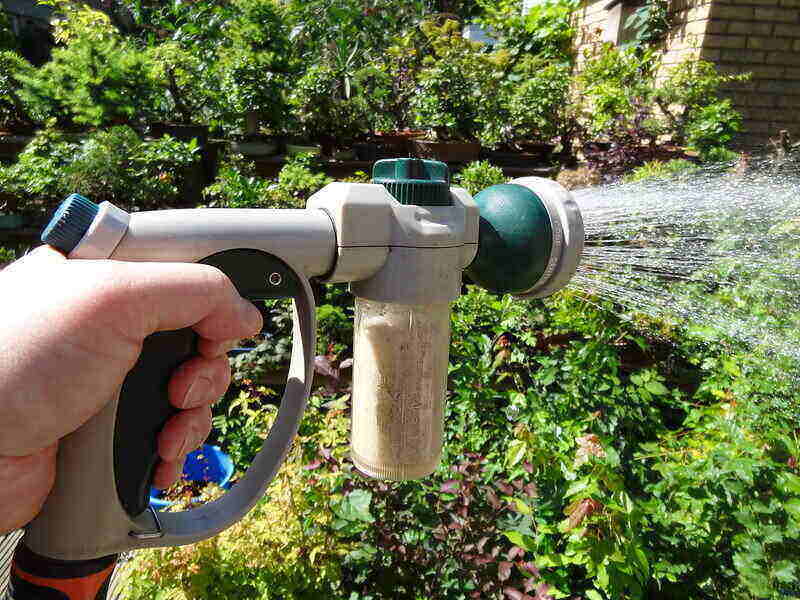
Photo Credit: Jerry Norbury / Flickr / CC BY-ND 2.0
Liquid fertilizers are available in a concentrated liquid form and must be mixed with water before applying them to the lawn. Many of them come in ready-to-spray bottles that attach directly to the end of your garden hose, so you don’t have to dilute them yourself.
These liquid fertilizers are quickly absorbed by the grass roots and foliage, providing a nutrient boost right away. Liquid fertilizers are beneficial for targeted applications or spot treatments, as they let you address specific regions needing extra care. You can also use them for foliar feeding, which involves spraying nutrients directly onto the leaves for rapid absorption.
Organic Fertilizers
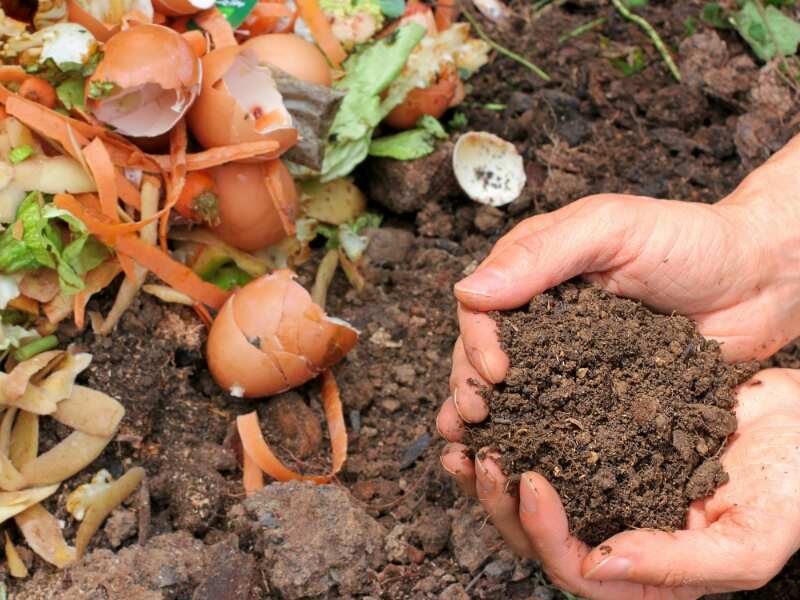
Photo Credit: melGreenFR from Pixabay / Canva Pro / License
Organic fertilizers are made from natural materials like compost, manure, and plant waste. Because of their sustainable and eco-friendly nature, they have acquired favor among ecologically aware lawn enthusiasts.
Organic fertilizers improve your soil’s structure and moisture retention while nourishing it with nutrients. They slowly and steadily release nutrients over time, ensuring a steady supply to your lawn. This mild feeding method eliminates the possibility of nutrient imbalances or burns. Learn more about organic fertilizers by visiting our detailed guide to organic lawn fertilizers.
Synthetic Fertilizers
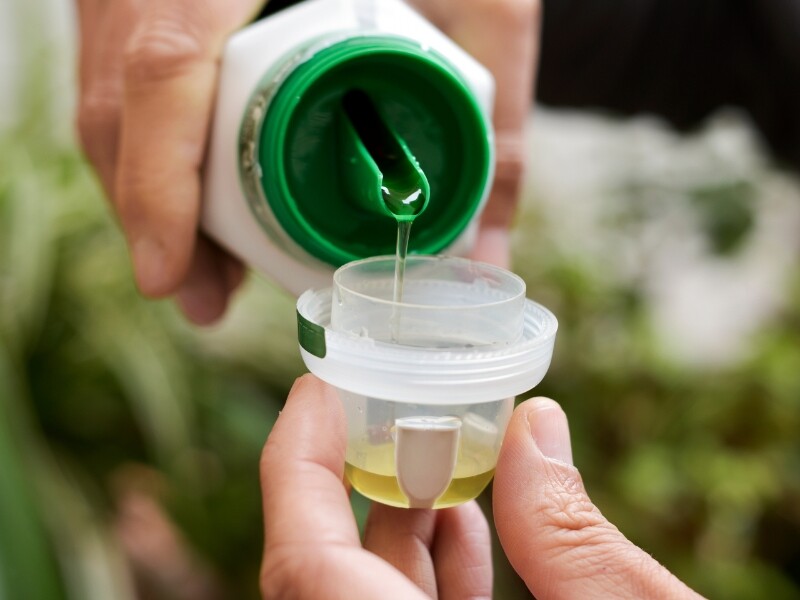
Photo Credit: Juan Moyano / Canva Pro / License
Synthetic fertilizers are chemically prepared and often have higher nutrient concentrations than organic ones. They are designed to give rapid fertilizer release, resulting in immediate benefits for your grass. Synthetic fertilizers are simple to use and provide exact control over nutrient levels, allowing you to adapt the fertilizer to the specific needs of your lawn.
However, using synthetic fertilizers with caution is critical, as excessive use can result in nutrient runoff, water contamination, and harm to vital soil organisms.
Slow-Release Fertilizers
Slow-release fertilizers offer your lawn a gradual and consistent delivery of nutrients over time. They are typically made of coated granules or pellets that degrade slowly and release nutrients in stages as they break down.
This controlled-release mechanism guarantees that your grass receives a consistent supply of nutrients, resulting in even growth and a lower chance of nutrient runoff. Slow-release fertilizers are a fantastic alternative for homeowners looking for ease and consistency. However, they will not have the same immediate effect as quick-release fertilizers.
Quick-Release Fertilizers
Quick-release fertilizers provide your grass with a rapid burst of nutrients. They are designed to have an immediate impact and frequently contain higher nutritional concentrations. When you need quick results or want to address specific issues, such as greening up your lawn before an event or correcting nutrient shortages, quick-release fertilizers are a great choice.
However, overapplication can result in excessive growth, increased mowing frequency, and probable nutrient runoff. Quick-release fertilizers are also more likely to cause fertilizer burn.
Special Fertilizers
These fertilizers serve your lawn’s specific needs. Special lawn fertilizers include:
- Weed and feed fertilizers help you control weeds and provide essential nutrients to your lawn at the same time. They contain pre-emergent herbicides to prevent weeds from popping out of the soil and/or post-emergent herbicides to kill already-grown weeds.
- Starter fertilizers are rich in phosphorus and help you establish a newly planted lawn. They help young grass plants strengthen their roots and develop rapid growth.
- Seasonal lawn fertilizers are specially designed for different seasons of the year. For example, a summer fertilizer should only be used in summer, and a fall fertilizer should only be used in fall.
FAQ About Lawn Fertilizer
Is it necessary to conduct a soil test before fertilizing?
While not necessary, testing your soil can provide vital information about your soil’s nutritional content, pH levels, and any deficiencies. A soil test allows you to make more educated fertilizer decisions by addressing particular nutrient imbalances and avoiding over- or under-fertilization.
How frequently should I fertilize my lawn?
The frequency of lawn fertilization depends on factors such as grass type, fertilizer type, climate, and general lawn health. Cool-season grasses benefit from fertilization in the early spring and fall, while warm-season grasses may require fertilization throughout the spring and summer.
For more informed fertilizer applications, you can follow our lawn fertilizer schedule.
Should I use organic or synthetic fertilizer?
Whether you choose organic or synthetic fertilizers depends on your preferences and the environment around you. Organic fertilizers are a part of eco-friendly lawn care and have natural composition. In contrast, synthetic fertilizers comprise chemical formulation, providing precise nutrition control and immediate effects.
Can I use compost or lawn clippings as a natural fertilizer?
Absolutely! Lawn clippings and compost are rich in nutrients and are excellent lawn food. After mowing, you can recycle nutrients into the soil by leaving grass clippings on the lawn. You can also use compost generated from yard waste, kitchen leftovers, and other organic materials to fertilize the lawn naturally. Just make sure the compost is well-aged and decomposed before using it.
Final Thoughts
A beautiful, healthy lawn that makes the rest of the neighborhood jealous takes more than just regular watering and mowing to create that ideal green paradise. Your lawn requires proper fertilization to thrive all year round. Choosing the right fertilizer for your lawn is essential for promoting healthy growth and maintaining a vibrant, lush appearance.
With a variety of options available, selecting the best lawn fertilizer can be a daunting task. If you’d rather leave fertilization in the hands of a professional so you can enjoy your weekends without worrying about the lawn, connect with a local lawn care service through WikiLawn today.